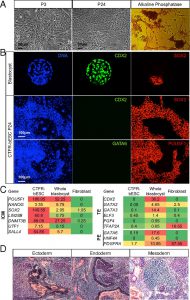For 35 years, scientists have been trying to split embryonic stem cells from dairy cows, but they have not succeeded. Under suitable conditions, embryonic stem cells can proliferate indefinitely and differentiate into any cell type or tissue. This may have a certain impact on cultivating transgenic super cows.
Recently, a research report published in the international magazine Proceedings of the National Academy of Sciences, scientists from the University of California developed a new culture system that can help researchers effectively obtain stem cells.

The use of large livestock (such as cattle) to obtain embryonic stem cells is critical for genetic testing, genomic engineering research, and human disease research. These cells provide the best model for human stem cell therapy. Mice and rats are too small to effectively clarify whether a specific therapy can be safely and effectively applied to a human body.
Breed cows faster and better
If researchers can use stem cell lines to make gametes (sperm or egg cells), the impact may be far-reaching, and techniques such as body diplomacy can reduce the time it takes to produce GM cows, says researcher Pablo Ross, which could be radically changed the way of genetic sequencing. In just a few years, scientists can effectively accelerate the process of improving the offspring of animals. In two and a half years, you may be able to get the task that was completed in about 25 years, that is, to raise a cow.
The researchers said that the cows we cultivate in the future may have more muscles, can produce more milk, release less methane, and are more adaptable to climate warming; this study may be expected to help promote dairy farming more continued development, and the animals that are cultivated may have more characteristics, such as high disease resistance.
Reference
Yanina Soledad Bogliotti, Jun Wu, Marcela Vilarino, et al. Efficient derivation of stable primed pluripotent embryonic stem cells from bovine blastocysts. PNAS 2018 doi:10.1073/pnas.1716161115 For research or industrial raw materials, not for personal medical use!
 The use of large livestock (such as cattle) to obtain embryonic stem cells is critical for genetic testing, genomic engineering research, and human disease research. These cells provide the best model for human stem cell therapy. Mice and rats are too small to effectively clarify whether a specific therapy can be safely and effectively applied to a human body.
Breed cows faster and better
If researchers can use stem cell lines to make gametes (sperm or egg cells), the impact may be far-reaching, and techniques such as body diplomacy can reduce the time it takes to produce GM cows, says researcher Pablo Ross, which could be radically changed the way of genetic sequencing. In just a few years, scientists can effectively accelerate the process of improving the offspring of animals. In two and a half years, you may be able to get the task that was completed in about 25 years, that is, to raise a cow.
The researchers said that the cows we cultivate in the future may have more muscles, can produce more milk, release less methane, and are more adaptable to climate warming; this study may be expected to help promote dairy farming more continued development, and the animals that are cultivated may have more characteristics, such as high disease resistance.
Reference
Yanina Soledad Bogliotti, Jun Wu, Marcela Vilarino, et al. Efficient derivation of stable primed pluripotent embryonic stem cells from bovine blastocysts. PNAS 2018 doi:10.1073/pnas.1716161115
The use of large livestock (such as cattle) to obtain embryonic stem cells is critical for genetic testing, genomic engineering research, and human disease research. These cells provide the best model for human stem cell therapy. Mice and rats are too small to effectively clarify whether a specific therapy can be safely and effectively applied to a human body.
Breed cows faster and better
If researchers can use stem cell lines to make gametes (sperm or egg cells), the impact may be far-reaching, and techniques such as body diplomacy can reduce the time it takes to produce GM cows, says researcher Pablo Ross, which could be radically changed the way of genetic sequencing. In just a few years, scientists can effectively accelerate the process of improving the offspring of animals. In two and a half years, you may be able to get the task that was completed in about 25 years, that is, to raise a cow.
The researchers said that the cows we cultivate in the future may have more muscles, can produce more milk, release less methane, and are more adaptable to climate warming; this study may be expected to help promote dairy farming more continued development, and the animals that are cultivated may have more characteristics, such as high disease resistance.
Reference
Yanina Soledad Bogliotti, Jun Wu, Marcela Vilarino, et al. Efficient derivation of stable primed pluripotent embryonic stem cells from bovine blastocysts. PNAS 2018 doi:10.1073/pnas.1716161115